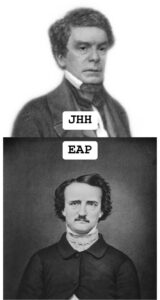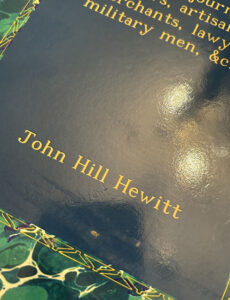Why Do We Write?
Why Do We Write?
I never knew him. Even after he died, it would be another 60 years before I made my humble entrance onto the world stage as one of his many great, great grandchildren. The family occasionally spoke of him through the years, but I didn’t start to ask questions until I was in my 20’s.
He is my famous ancestor, a man formerly renowned for his musical and literary works, not to mention his well-heeled occupations as dramatist, professor and newspaper Editor.
His parents were famous and educated as well, along with his siblings and cousins for all manner of accomplishments in the fine arts. In fact, if you look him up (or his family line) you will discover that most of them have Wikipedia pages (you know you’ve arrived when you have your own Wikipedia page).
By now, I’m sure you’re wondering who I’m referring to, so I’ll put an end to your white-knuckled impatience. I am speaking about John Hill Hewitt, the great writer, poet, composer and author.
Underwhelmed, eh?
Yes, he gets that a lot.
John Hill Hewitt was indeed a famous man of musical and literary talent in 19th century America. He was born in 1801, and by 1825, he had published his first song, ‘The Minstrel’s Return’d from the War,’ which would go on to receive international acclaim. It was this song that earned Hewitt the title of, “Father of the American Ballad.” Unfortunately for my family, the song was published without a copyright, so there is no family fortune, or Hewitt millions.
John Hill Hewitt would go on to produce hundreds of songs, which would garner him a measure of fame and recognition. He also published many poems, essays, stories and plays. Several plays were produced in the South during the Civil War, and were quite popular in the confederate states, since they portrayed Abraham Lincoln in an unflattering light.
 It is interesting to note that, during his life here on earth, John Hill Hewitt possessed the uncanny ability to be in the foreground of American History. He was present for the maiden launch of the first Fulton steamboat. He was in the room when Samuel Morse sent the first telegraph message over the Baltimore-Washington line with the famous message, “What hath God wrought.” He mingled and was personally acquainted with the likes of Henry Clay, John Tyler, Jefferson Davis, Davy Crockett, Walt Whitman, and … Edgar Allan Poe.
It is interesting to note that, during his life here on earth, John Hill Hewitt possessed the uncanny ability to be in the foreground of American History. He was present for the maiden launch of the first Fulton steamboat. He was in the room when Samuel Morse sent the first telegraph message over the Baltimore-Washington line with the famous message, “What hath God wrought.” He mingled and was personally acquainted with the likes of Henry Clay, John Tyler, Jefferson Davis, Davy Crockett, Walt Whitman, and … Edgar Allan Poe.
Certainly, an illustrious and accomplished man by human standards. In fact, he remains a celebrity in our family hagiography.
And yet … John Hill Hewitt was not satisfied. If you read his autobiography, or the family papers and letters, it becomes apparent almost immediately that he felt as if his work was not adequately appreciated. He was competitive and occasionally quarrelsome with other luminaries of the age, as he struggled for prominence in the American literary world.
This struggle was painfully evident in Hewitt’s relationship with Edgar Allan Poe. I think it is even safe to say, that my dear ancestor believed Poe to be his nemesis. He seemed perpetually annoyed and then perplexed by Poe’s rising fame—never fully appreciating Poe’s vision or appeal.
Poe, for his part, was not terribly fond of my grandfather either—and their mutual animosity became physical one night in a Baltimore alleyway. Both men had entered a literary contest sponsored by The Visitor. JH Hewitt was the Editor of The Visitor, so he entered the contest using a pen name. As a result, Poe and Hewitt were awarded first prize. Poe, for his short story, and Hewitt for his poem.
Poe was not happy with this arrangement, and believed that he should have won both prizes. He accused Hewitt of cheating, since he was the paper’s editor, and of course my great, great grandfather being the man he was, punched Edgar Allan Poe in the face. According to history, here ends the tale of two famous literary talents duking it out in the streets of Baltimore. But I’ll let you in on a little family lore: my great-grandmother always used to say, “That papa had to hit Poe because he was no gentleman, and he didn’t know how to treat his wife.” So, there you have it; a little semi-ancient gossip that didn’t make it into the history books.
After Poe’s death, John Hill Hewitt was tapped to offer one of several eulogies; a task he did not relish. But that wouldn’t be the last time he was asked about Poe. Eventually, everyone wanted to talk to him about his animus toward Poe. The contentious relationship between the two men, actually became a defining factor during the last half of my grandfather’s career. This must have been a sobering realization.
Life is full of ironies … and this little story is one of them. John Hill Hewitt spent nearly a century crafting and honing a place for himself in the annals of literary fame, while simultaneously attempting to outshine other luminaries in the field … Edgar Allan Poe, specifically. But in the final analysis, it was Poe who would go on to garner literary immortality, while my grandfather became nothing more than a footnote at the bottom of a biography on the life of Edgar Allan Poe.
Reflecting on all of this family history leads me back to my original question: Why do we write? What’s in it for us? Are we writing because we believe in something? Do we have a message, a philosophy … an agenda? Do we write for personal satisfaction, catharsis, recognition … or something else?
I love my family, and I adore our family hagiography, but I’m a realist and I can see the errors of my literary ancestor rather clearly. He possessed credible talent, but having talent was never enough for him. He wanted something beyond writing and composing. He loved fame … perhaps more than he loved to write, and I cannot help but wonder if that was his downfall.
We all like to receive recognition. Who doesn’t love a good review? But, I pray that I will always write, first and foremost for God, and then for me.
And when it is time for me to leave this earth, I want only one sentence written about my life:
“God is all that matters, and that is why she wrote.”
© Copyright 2023 by Sarah Torbeck
Images from the personal files of Sarah Torbeck. Used with permission.
- Why Do We Write? - December 7, 2023
- Lovely Genealogies - May 23, 2023
- For I know the Plans I Have for You - February 28, 2023


Thanks, Sarah! Fascinating vignette! This could be the seed of an intriguing historical novel…
I have been thinking the same thing for quite awhile. I just need the time, and an ending (isn’t that always the way?).
What a beautiful reflection! Thanks for sharing the fascinating history of your family, as well as your insightful response to it.
I especially appreciated your last line: “And when it is time for me to leave this earth, I want only one sentence written about my life: ‘God is all that matters, and that is why she wrote.’
Amen to that.
Thank you so much, Sarah. This is something I have thought about for quite awhile. It’s one of the reasons I quit teaching, and began to write … because I wanted to use what God had given me for His glory alone. (But it’s still really nice when people like what I write! 😉 )
Yes, “God is all that matters and that is why we write!” Thank you for the beautiful reminder, Sarah!
Amen! <3
Oh goodness, I’m so glad I finally took the time to read this. I love it! Keep on writing, as you are so good at bringing joy through your pen.
Hi Eva.
Thank you so much for the compliment. It means more than you know. This article has been floating around in my head for years. It was just time to write it. My only regret, is that I could have written much more, but word constraints, and the modern attention-span have limited that endeavor. Perhaps I will write a second installment. Some people want me to write a novella. I think it would make my great-great Grandfather happy to know that he is still remembered … even though it’s not exactly HOW he wanted to be remembered. 😀
–Sarah